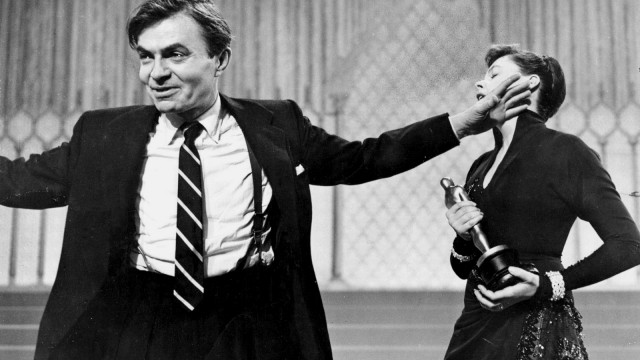I have now seen all three versions of A Star Is Born. Part of me now wonders how exactly it will be possible to update it for yet another remake, and part of me thinks it’s all too depressingly easy. All you have to do is remember that you have to pay lip service to the idea of a woman’s agency while still not actually giving her anyone, and you’re okay.
The third version is a much looser remake than the second, but the basic plot outline of all three holds. Young woman make it big in the entertainment industry in part with the help of a man who is more established in it—and also a total drunk. They fall in love and marry. Her career is on the way up while his is in the toilet, and his drinking is starting to hurt her career. So she decides to make sacrifices for him, generally of the “I will stay home with my husband” nature, and he (spoilers!) kills himself so that she will keep her career.
The ending line of two of the three versions is “Hello, everybody. This is Mrs. Norman Maine.” Now, one of the reasons that the Barbra Streisand version doesn’t quite end that way is that the naming convention in question was on its way out anyway, and the other was that the character as played by Kris Kristofferson had a different name. But she does make an explicit show of taking his last name to show how important he was.
That is basically the unspoken underlying theme of all three versions—the man is more important than the woman. Why would she give up her career to keep him happy and become unhappy herself? Why is his inability to control his drinking more important than her dreams? In all three versions of the story, she is working very hard toward her goals before she ever meets him, though it’s true that, in all three versions of the story, he helps her achieve them.
Actually, that part I’m okay with—not because every woman needs a man to help her achieve success in the entertainment industry but because success in the entertainment industry is much easier if you know someone. Doesn’t really matter who—somehow befriending Scarlett Johansson tomorrow would do a lot more for your chances of success than a year of working on your own, and everyone knows it. It’s not a guarantee, but the first two versions of the story make it quite clear how improbable success is. The first one even lays out the numbers. The second has Judy Garland in that time-honoured profession of the out-of-work actress, waiting tables. Or anyway working as a carhop.
But if the man can’t pursue his dreams, there is nothing left for him. He must be coddled and supported the whole way through, even if it means giving up the woman’s dreams. Now, to the plot’s credit, he recognizes what’s going on and won’t accept it, but then he sees his choices as doing the thing he loves or death. Since he cannot do the thing he loves, she must give up everything to sit and hold his hand and keep him from drinking over despair of his lost dreams. You don’t see him waiting tables.
I think the second version makes it most explicit that he is trying to prevent the woman he loves from giving up everything for him, and I really do admire his determination to prevent that from happening. I just argue with the premise that it’s the only way. The whole time, I was wondering things like, “Couldn’t he find another line of work? Even being an acting coach or something?” In order for a fourth version of the movie to work, I’d like to think you’d have to address this question, if nothing else.
Yes, I know. Giving up your dreams is painful, and Norman Maine or the Kris Kristofferson equivalent thereof has burned too many bridges to really have his dream job ever again. But the woman is supposed to live with that because all she needs is The Love of a Good Man, and the man’s only option to prevent her from that choice is death. It’s a much easier way out than living with the loss of your dreams, and the women choose that without question.

